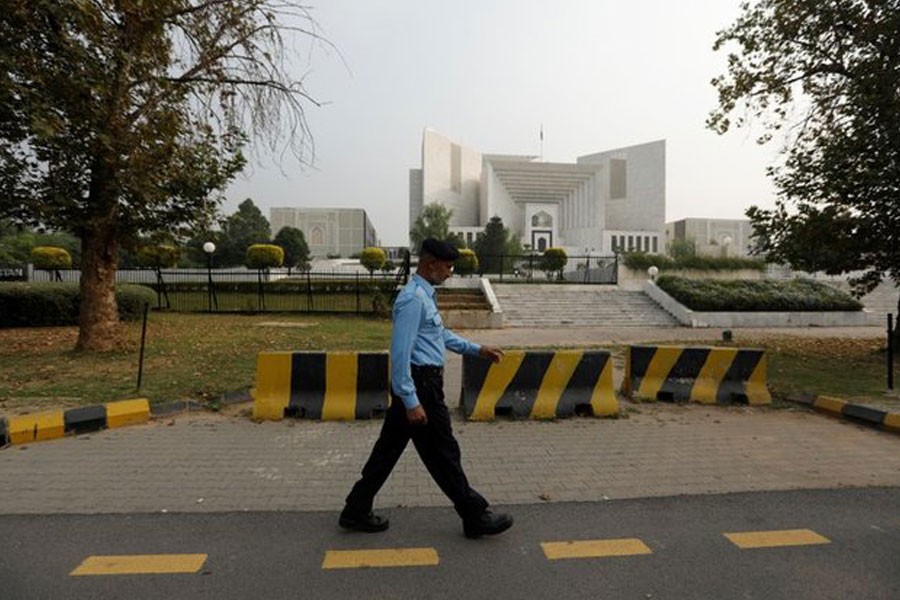Pakistan’s Supreme Court on Wednesday freed a Christian woman from a death sentence for blasphemy against Islam and overturned her conviction, sparking angry protests and death threats from an ultra-religious party and cheers from human rights advocates.
Asia Bibi, a mother of four, has been living on death row since 2010 when she became the first woman to be sentenced to death by hanging under Pakistan’s draconian blasphemy laws, which critics say are too harsh and often misused.
She was condemned for allegedly making derogatory remarks about Islam after neighbours objected to her drinking water from their glass because she was not Muslim.
Bibi has always denied blasphemy.
The case outraged Christians worldwide and been a source of division within Pakistan, where two politicians who sought to help Bibi were assassinated, reports Reuters.
Chief Justice Saqib Nasir, who headed a special three-person bench set up for the appeal, cited the Koran in his ruling, writing “Tolerance is the basic principle of Islam” and noting the religion condemns injustice and oppression.
DEATH THREATS
Supporters of Islamist political party Tehreek-e-Labaik (TLP), which was founded to support blasphemy laws, immediately condemned the ruling and blocked roads in major cities, pelting police with stones in the eastern city of Lahore.
The TLP’s leadership called for the death of Nasif, the chief justice, and two other judges on the panel.
“The patron in chief of TLP, Muhammad Afzal Qadri, has issued the edict that says the chief justice and all those who ordered the release of Asia deserve death,” said party spokesman Ejaz Ashrafi.
The party also called for the ouster of the government of new Prime Minister Imran Khan.
The TLP was founded out of a movement supporting a bodyguard who assassinated Lahore provincial governor Salman Taseer for advocating for Bibi in 2011. Federal minister for religion Shahbaz Bhatti was also killed after calling for her release.
Bibi’s lawyer on Wednesday called the court ruling “great news” for Pakistan.
“Asia Bibi has finally been served justice,” lawyer Saiful Mulook told Reuters. “Pakistan’s Supreme Court must be appreciated that it upheld the law of the land and didn’t succumb to any pressure.”
Street protests were spreading by mid-afternoon, paralysing parts of Islamabad, Lahore and other cities.
In November, TLP staged a crippling blockade of Islamabad after small changes to a religious oath, which it claims was tantamount to blasphemy. Seven people were killed and more than 200 wounded in clashes with the police and TLP’s supporters only dispersed after striking a deal with the military.
Insulting Islam’s prophet is punishable by death under Pakistani law, and blasphemy accusations stir such emotions that they are almost impossible to defend against. Dozens have been killed following blasphemy claims, sometimes by mobs of men.
Rights groups say the blasphemy law is exploited by religious extremists as well as ordinary Pakistanis to settle personal scores. The law does not clearly define blasphemy and evidence might not be reproduced in court for fear of committing a fresh offense.
Bibi’s representatives have claimed she was involved in a dispute with her neighbours and that her accusers had contradicted themselves.
In February, Bibi’s husband, Ashiq Masih, and one of her daughters met Pope Francis shortly before Rome’s ancient Coliseum was lit in red one evening in solidarity with persecuted Christians, and Bibi in particular.
The pope told Bibi’s daughter: “I think often of your mother and I pray for her.”
Christians make up only about 2 per cent of Pakistan’s population and are sometimes discriminated against.
“This is a landmark verdict. For the past eight years, Asia Bibi’s life languished in limbo,” said Omar Waraich, deputy South Asia director for Amnesty International.
“The message must go out that the blasphemy laws will no longer be used to persecute the country’s most vulnerable minorities.”


